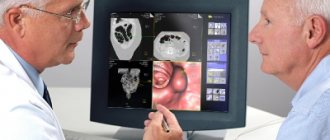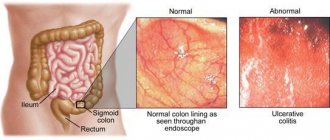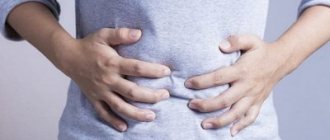Are you suffering from abdominal pain, cramps and constant bowel movements? Unpleasant sensations in the intestinal area can ruin all plans, so we use various medications to relieve abdominal discomfort. But these measures only allow you to temporarily get rid of the symptoms of a serious disease, which return again and again. What if these symptoms have a single cause - irritable bowel syndrome? What this disease is, what its symptoms are and how to cure it, we will tell you in this article.
Causes of IBS with constipation
When self-treating irritable bowel syndrome, you should know the factors that lead to it.
- Psychological - emotional tension, stress. IBS in this regard is a vicious circle. Irritation that does not find a rational explanation and solution leads to the syndrome. The disease reduces the quality of life, provoking negative emotions.
- Social - unfavorable conditions, for example, poor nutrition.
- Biological - intestinal infections.
Irritable bowel syndrome with constipation is recognized by most researchers as a psychosomatic disease. Indeed, past infections can aggravate the condition, but the main cause of the disease lies in other mechanisms. What distinguishes IBS from other types of disorders is that it does not occur due to structural changes in the intestinal walls.
The mechanism of its development is a violation of the nervous regulation of intestinal motor function. Thus, Sheptulin notes in his work that “IBS is in many cases a unique clinical form of neurosis, in which intestinal disorders become the leading clinical symptoms” (Sheptulin A. A., 1999, p. 8).
People with IBS have a higher sensitivity of the intestinal apparatus to stretching, since the threshold for receptor excitability is lower. This leads to pain and discomfort. In this case, constipation can be associated with both a weakening and an increase in propulsive intestinal motility. Propulsive peristalsis ensures the movement of intestinal contents to the anus.
The leading causes of the syndrome are psychosocial factors. We can talk about both chronic stress and high workloads, social unsettlement, one-time peak loads and shocks. Scientists talk about a certain genetic predisposition to the disease.
The condition for the appearance of visceral hypersensitivity can be certain factors: +
- past infections;
- stress, trauma,
- operation, etc.
These factors change intestinal motility. As a result, a stimulus of normal intensity (for example, a small volume of gases moving through the intestine) leads to an increased pain response.
Prevention, prognosis
Exacerbation can be prevented by normalizing the diet (balanced diet, avoiding coffee, alcohol, carbonated drinks, fatty and spicy foods), and adequate drinking regimen. You should take care of your psycho-emotional status: avoid stressful situations, maintain peace of mind, control reactions to external stimuli, master methods of complete relaxation, rest, get involved in creativity or a new hobby.
Unreasonable use of medications is prohibited.
Dosed physical activity helps eliminate the symptoms of the disease, the therapeutic effect of which is based on relieving mental stress, improving the emotional state, general well-being, resisting stress, and eliminating excess weight. Doctors recommend regular walking, jogging, swimming, and yoga. Exercises form a muscle corset that ensures normal intestinal motility. Between training and meals you should maintain an interval of 1.5-2 hours.
The prognosis is favorable. IBS is a common disease that does not progress. The pathology is characterized by a long course and absence of complications. 30% of patients are completely cured if they follow doctors’ recommendations. Regression of the clinical picture is rarely observed after a change of place of residence or the surrounding psychological situation.
Symptoms
In irritable bowel syndrome with a predominance of constipation, the clinical picture from the gastrointestinal tract includes the following signs:
- bowel movements less than three times a week;
- hard consistency;
- straining;
- feeling of incomplete bowel movement;
- abdominal pain, bloating.
The feces may not just be hard, but bean-shaped. Other symptoms of IBS with constipation include a false urge to have a bowel movement, the release of mucus during bowel movements, and a feeling of transfusion.
Constipation develops against the background of pain, which is of particular importance in diagnosis - this is how IBS can be distinguished from functional constipation, it is not accompanied by such severe pain.
Pain can vary: from dull pain to acute spasms, from constant pain to paroxysmal pain. Painful sensations may last several minutes or hours.
People with IBS often report other symptoms: frequent urination; in women, painful periods, increased fatigue, headaches, and aching back pain. Changes also affect the psycho-emotional sphere of a person: suspiciousness, anxiety, and irritability may occur.
The author N. S. Zhikhareva in her scientific work emphasizes that “IBS is a diagnosis of exclusion.” This means that symptoms may be similar to those of other disorders, and testing is required to make a diagnosis.
Diagnostics
The diagnosis is made by a gastroenterologist based on the clinical picture (irregularity of complaints, alternation of diarrhea and constipation), examination (palpation, percussion, auscultation), medical history, and family history.
IBS is a diagnosis of exclusion. For this reason, a specialized specialist prescribes additional studies:
- CBC (red blood cells, hemoglobin, platelets, leukocytes, expanded formula).
- OAM (epithelium, bacteria).
- Coprogram.
- BAC (total protein, albumin, urea, creatinine, CRP, bilirubin, ALT, AST, GGTP, alkaline phosphatase, sodium, potassium, chlorine, ferritin).
- Coagulogram (APTT, PT, fibrinogen, INR).
- Culture of blood, urine, feces for flora and sensitivity.
- Ultrasound of the abdominal cavity and retroperitoneal space (assessment of the liver, spleen, kidneys).
- FEGDS.
- Colonoscopy, irrigoscopy, sigmoidoscopy.
- Barium passage.
- CT with contrast.
- MRI.
- Ultrasound of the pelvic organs followed by consultation with a gynecologist (for women).
A psychotherapist assesses the patient's psychological status. He notes signs of anxiety and emotional lability.
The scope and complex of functional examinations is determined by the doctor. The presence of organic pathology (leukocytosis, infectious agents in samples, benign or malignant neoplasms according to the results of endoscopy, CT, MRI, ultrasound) excludes IBS.
Danger and complications
IBS with a predominance of constipation reduces a person’s quality of life. A prolonged absence of stool can cause chronic intoxication of the body, depletion of defenses, exacerbation of dermatological diseases and allergies. Pain contributes to a reduced emotional background, can limit social activity, and cause irritability and nervousness.
In the long term, persistent constipation can be a risk factor for the development of cancer of the digestive system, atherosclerosis, thrombosis, heart attacks, and strokes. Stagnation of feces leads to overstretching of the intestinal walls and accompanying structural changes and inflammatory processes.
Treatment
Drug treatment for IBS should be prescribed by a doctor. Non-drug methods include:
- diet,
- psychotherapy.
The use of medications is determined by the form of the syndrome. If constipation predominates, the following groups of medications can be used:
- modern antispasmodics that do not affect the functioning of the cardiovascular system;
- bulk laxatives;
- gastroprokinetics, which stimulate intestinal motility.
Among bulk laxatives, psyllium is of particular importance. Herbal preparations have been developed on its basis. Psyllium is obtained from plantain seeds. Psyllium retains water in the intestines, increases the volume of intestinal contents and softens stool, resulting in a mild laxative effect. As a rule, such products are approved for long-term use.
Symptomatic treatment of IBS with constipation may include the use of osmotic laxatives as indicated, but it is better to avoid taking them regularly. As a rule, such funds are used in preparation for endoscopic diagnosis. They cause the so-called drastic effect, frequent and profuse, watery stools, and can also increase pain.
A separate method of treatment is the prescription of anti-anxiety medications and antidepressants. But such means should be used with caution. Doctors usually prescribe them in short courses lasting up to 14 days, mainly during periods of severe stress. For example, this may be appropriate for a patient going through divorce proceedings or a student who is about to start a session.
Long-term use of anxiolytics, or anti-anxiety drugs, leads to a decrease in their effectiveness and the development of addiction. Antidepressants are also prescribed strictly according to indications, but the paradox is that they can cause constipation - many drugs in this group have such a side effect. Therefore, it is better to weigh everything and discuss this approach in detail with your doctor. In some cases, it is advisable to get by with a course of psychotherapy.
The development of a diet should be based on the individual characteristics of a person’s health status and the leading symptoms of the syndrome. If additional fiber may be contraindicated in IBS with diarrhea, then constipation is a reason to reconsider the diet. Products with coarse fiber will help cope with the symptom.
The incidence of lactase deficiency in people with IBS is the same as in healthy individuals. But eliminating dairy products from your diet can be helpful. Sheptulin explained this in detail: “It should be borne in mind that in a number of patients with IBS, diarrhea may be a manifestation of individual intolerance to any food products. In such cases, elimination diets can have a good effect” (Sheptulin A. A., 1999, p. 8).
Prohibited foods for intestinal diseases
If you have an intestinal disease, consuming dairy products is prohibited.
The daily menu for a sick intestine should not include those foods that cause rotting and fermentation and contribute to gas formation.
Legumes and coarse plant fiber should be excluded. Vegetable fats are also not recommended, as they interfere with the absorption of nutrients.
Spices have an irritating effect on the digestive tract. Products that are prohibited:
- Fatty meats and fish;
- Legumes;
- Dairy products;
- Nuts;
- Spices;
- Fried eggs;
- Very salty foods;
- Fried and smoked dishes;
- Canned food;
- Sweet dishes;
- Mushrooms;
- Coffee;
- Caviar;
- Alcoholic and carbonated drinks;
- Fast foods.
Diet therapy for IBS with constipation
Diet for IBS with a predominance of constipation does not imply the complete exclusion of any foods. Their number may be reduced due to the fact that they cause dyspeptic disorders. An increase in the volume of plant fibers is shown. This concept includes two types of fibers with different effects:
- soluble - increase the volume of feces and soften them, stimulate peristalsis;
- insoluble - also affect intestinal motor function, but with an emphasis on thorough removal of toxins, creating a favorable environment for the renewal of microflora.
The basis of the diet should be the following products:-
- lean meat, poultry;
- low-fat fish;
- cereals, crumbly porridges in water;
- vegetable oils;
- dairy products;
- fruits, vegetables, berries;
- dried fruits;
- bran bread
It is necessary to steam or boil dishes, and eat first courses daily. You can eat steamed omelettes, mousses, and choose buckwheat, pearl barley and other cereals as a side dish. It is better to avoid foods with an astringent, fixing effect, as well as foods that increase gas formation.
Restrictions apply to cabbage, legumes, fresh white bread, chocolate, cottage cheese, yesterday's kefir, tea and coffee, quince, pomegranate, rice, crackers, hard-boiled eggs.
It is important to review your diet if you have irritable bowel syndrome with constipation, but introduce additional dietary fiber gradually to prevent a deterioration in your well-being and increased pain. Some patients note that including bran in their diet increases bloating and pain.
Doctor Sheptulin tells what to do in this case: “Taking psyllium can have a good effect: it retains water, thereby increasing the volume of intestinal contents, and does not cause an increase in gas formation” (Sheptulin A. A., 2001, p. 538).
The English drug “Fitomucil Norm” will quickly increase the amount of fiber in your diet. Intestinal constipation is relieved gently and predictably. The biocomplex contains the shell of plantain psyllium seeds and dry fruits of domestic plum. Does not cause pain or spasms.
Find detailed information about the composition on the website.









